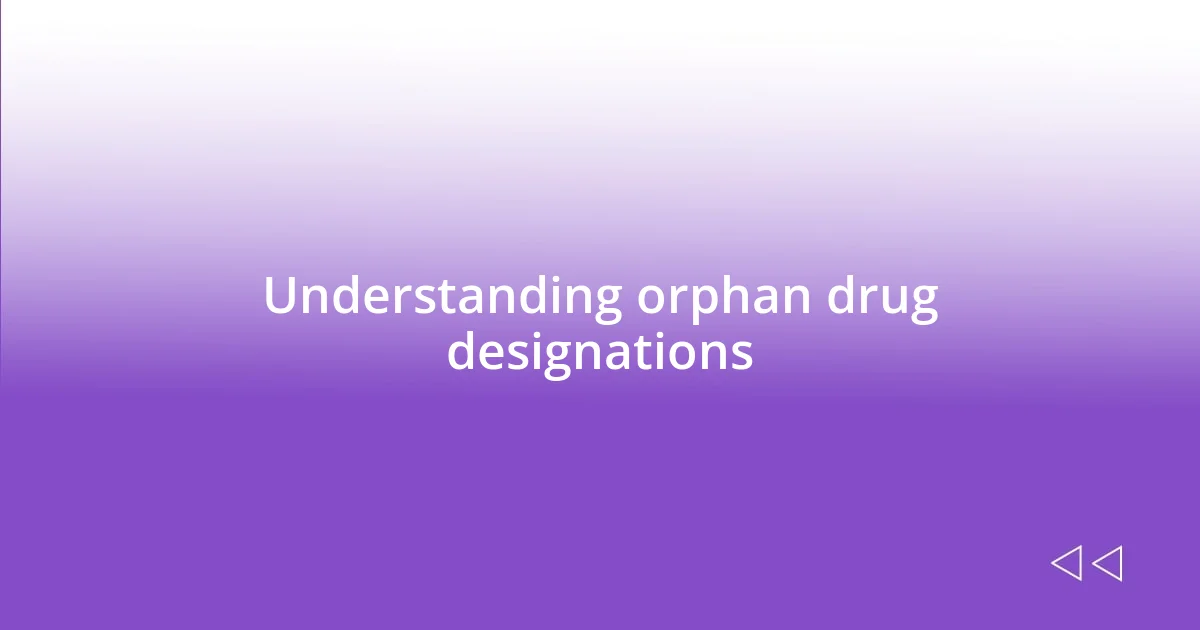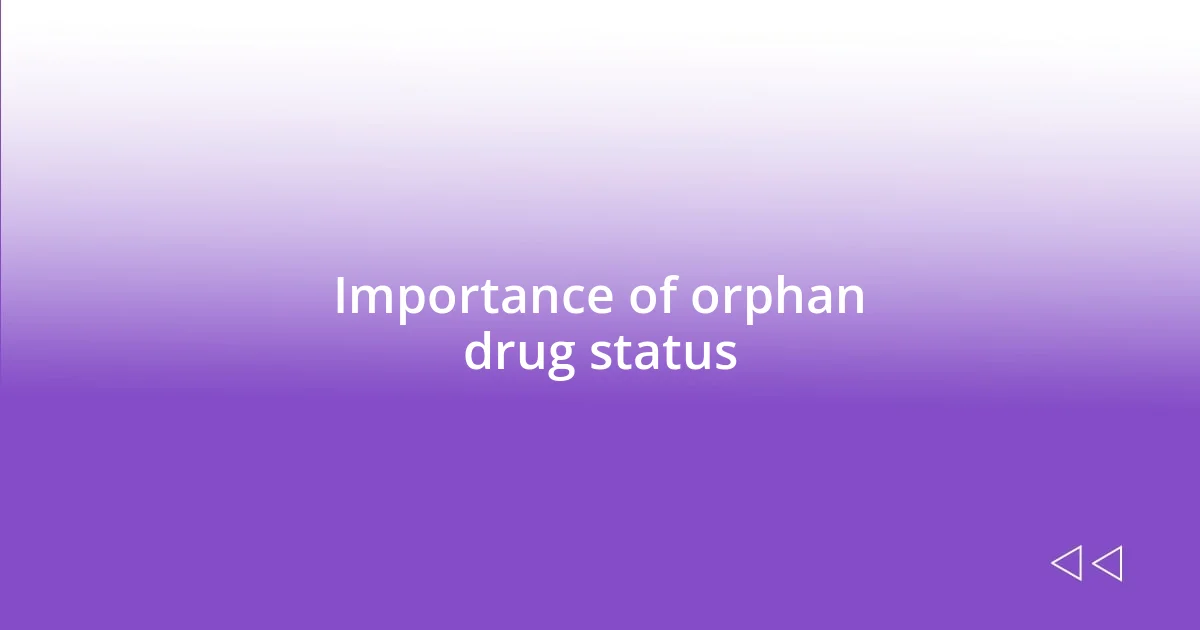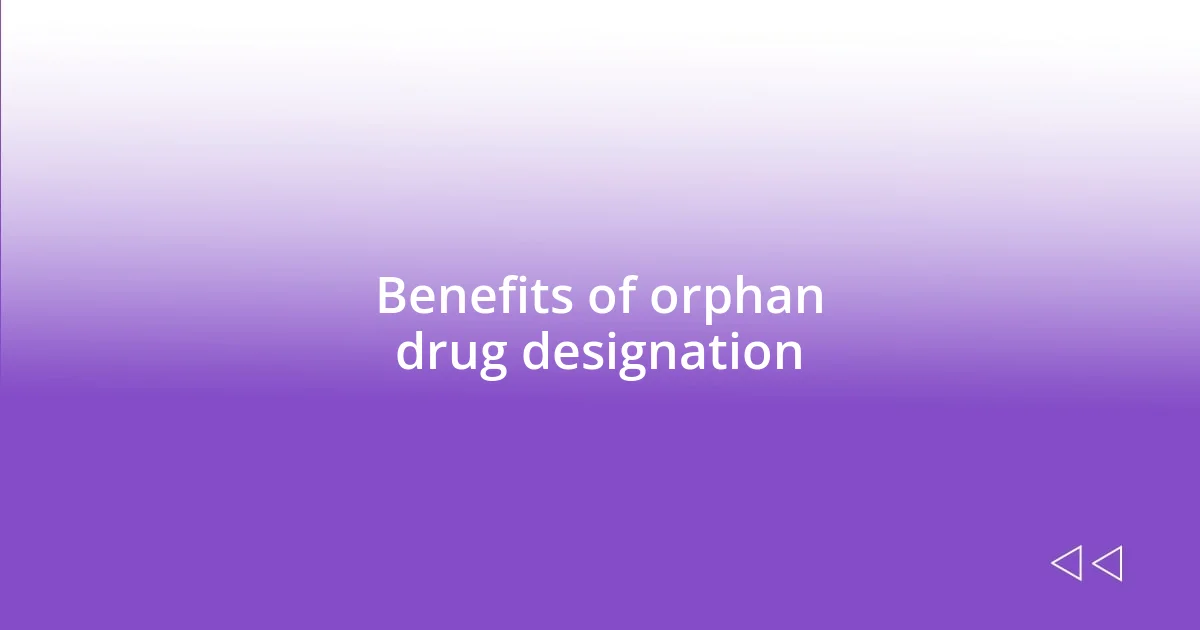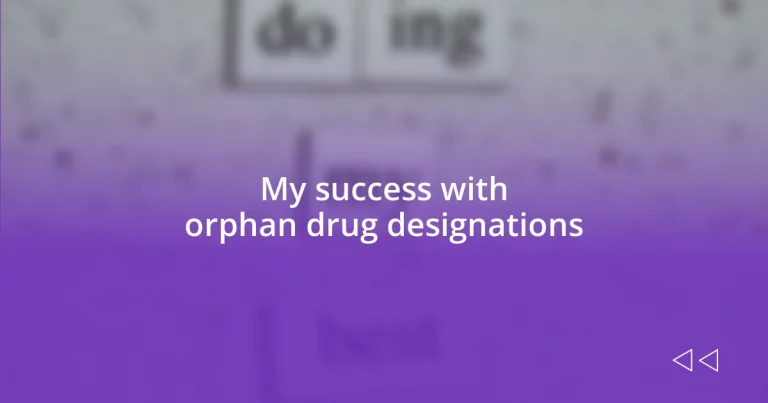Key takeaways:
- Orphan drug designations provide essential financial incentives, such as tax credits and market exclusivity, encouraging pharmaceutical companies to invest in treatments for rare diseases.
- The application process involves critical steps, including disease identification, evidence gathering, and engaging with the FDA, which can lead to valuable insights and opportunities.
- Benefits of orphan designation include expedited reviews, grants, and enhanced credibility, significantly impacting both the development process and patient access to treatments.

Understanding orphan drug designations
Orphan drug designations are crucial for developing treatments for rare diseases that affect fewer than 200,000 people in the U.S. I remember when I first learned about this concept; it struck me how these designations can significantly accelerate the drug development process. Can you imagine a world where a promising treatment might stall simply due to a lack of financial incentive?
The designation provides benefits like tax credits for clinical testing and a seven-year period of market exclusivity, which can make all the difference for companies venturing into these often-overlooked areas. When I see companies invest in these drugs, I feel a sense of hope—it’s like watching a light flicker to life in a place where darkness has long prevailed.
It’s also fascinating to note that while there are stringent criteria for receiving an orphan designation, these rules often encourage innovation. Have you ever wondered how many groundbreaking therapies wouldn’t exist without this support? This designation not only incentivizes research but also gives voice to patients who desperately need options.

Importance of orphan drug status
The orphan drug status is vital because it provides the necessary financial motivation for pharmaceutical companies to invest in rare diseases. I remember discussing this importance in a small group, and one participant shared how orphan designations could turn a small biotech dream into a reality. The prospect of tax credits and market exclusivity can be the difference between a drug being scrapped or moving forward to save lives.
Furthermore, the status fosters a collaborative environment among researchers and companies. I’ve seen firsthand how partnerships are formed specifically to tackle challenges rare diseases pose. It’s inspiring to witness scientists from diverse backgrounds come together, united by a common goal—to discover treatments that can transform lives.
Lastly, the impact on patients cannot be overstated. Many of them have waited for years for effective treatments. Personally, I’ve met families who felt abandoned by the medical community, only to find renewed hope through the opportunity presented by orphan drug status. It’s not just about the medicine; it’s about restoring faith and dignity in those affected by these rare conditions.
| Aspect | Details |
|---|---|
| Financial Incentives | Tax credits and market exclusivity |
| Encouragement of Collaboration | Promotes partnerships among researchers |
| Patient Impact | Gives hope to families awaiting treatments |

Steps to achieve orphan designation
Achieving orphan designation involves several critical steps, and navigating this path can be quite rewarding. I recall the excitement I felt when a colleague shared their journey through these processes. It instilled in me a deeper appreciation for the detailed preparation it requires. Here’s a quick breakdown of the essential steps to consider:
- Identify the Disease: Clearly define the rare disease and its impact on the patient population.
- Gather Evidence: Compile clinical data and relevant scientific research supporting the potential of your drug.
- Submit the Application: Prepare and submit your application to the FDA with detailed information, including the drug’s mechanism of action and the unmet medical need.
- Engage with the FDA: Maintain open communication and seek guidance from the FDA during the review process.
- Prepare for the Next Steps: If granted orphan designation, begin planning for clinical trials and consider how to leverage the benefits.
The process can feel daunting at times, but I have witnessed firsthand how each step presents its own opportunities. For instance, during a consultation meeting with the FDA, an unexpected question led my team to discover a new angle for our drug’s development. Such moments of insight can be incredibly valuable. I find that each application, while unique, is a powerful opportunity to shape the future of medical treatments—especially for those who depend on them most.

Key requirements for application
The key requirements for applying for orphan drug designation are quite specific and critical to understand. Firstly, you need to identify a disease that affects fewer than 200,000 individuals in the U.S. This number isn’t just a statistic; it represents real people who may be suffering without treatment. I remember meeting a researcher whose passion stemmed from personal experience—his brother had a rare condition, and defining that population was crucial for him to pursue potential solutions.
Next, gathering robust clinical and scientific data is essential. You’ll want to support your application with evidence that demonstrates the potential benefit of your drug over existing therapies, if any exist. I’ve seen teams pour over journals and patient testimonials, seeking that compelling narrative to illustrate their drug’s promise. It’s like piecing together a puzzle; every data point tells a story that can sway regulators and, ultimately, make a difference for patients.
Finally, once you’ve meticulously assembled your application, it’s vital to engage with the FDA. The process doesn’t end with submission. I’ve found that regular communication can yield insights and constructive feedback that refine your approach. It’s almost like having a conversation with a mentor who wants to guide you on your journey. Have you ever wondered how pivotal that initial dialogue can be? In my experience, it can reveal new opportunities and help navigate potential pitfalls that you might not have considered otherwise.

Strategies for successful designation
To successfully navigate the orphan drug designation process, one effective strategy is establishing strong relationships early on. I remember my first meeting with a regulatory consultant who had experienced the journey multiple times. Their insights were invaluable, not just for understanding the application but for building a rapport with the FDA. I learned that showing a genuine commitment to the patient population can make a tremendous difference in how your application is perceived. Isn’t it fascinating how a simple connection can enhance your credibility?
Research also plays a vital role in ensuring a successful designation. An impactful example from my own experience involves rigorous analysis of existing literature. In one instance, we uncovered a landmark study that had gone unnoticed by many. By integrating this data into our application, we changed the narrative around our drug’s effectiveness, compelling the review committee to take a closer look. Have you considered how your findings could reshape perceptions in your field? Emphasizing what makes your drug distinct can significantly bolster your case.
Lastly, don’t underestimate the power of storytelling throughout this process. While science is essential, weaving your data into a compelling narrative can resonate deeply with reviewers. During one presentation, I shared the poignant story of a patient who struggled with a rare disease; their journey truly highlighted the unmet need for treatment. That emotional connection transformed our data into something relatable and urgent. How often do we overlook the human element in our quest for scientific progress? By intertwining evidence with personal stories, we create a strong case for both compassion and advocacy in the realm of orphan drug designation.

Benefits of orphan drug designation
Orphan drug designation offers a range of significant benefits that can profoundly impact both developers and patients. One of the most evident advantages is the seven years of market exclusivity granted by the FDA upon approval. I still recall discussing this with a small biotech team excitedly mapping out their financial projections. That exclusivity can allow a startup to recoup its R&D investments, which in an industry often fraught with uncertainty, can be a lifeline. Isn’t it reassuring to know that if you develop a treatment for a rare condition, you have a period where competitors can’t jump in and dilute your efforts?
In addition to market exclusivity, companies can access expedited review processes and grants. I remember a colleague whose team received a significant grant specifically for researching a rare pediatric condition. That funding not only alleviated financial pressure but also propelled their work forward at an extraordinary pace. Think about how much faster innovation can advance when financial constraints are lifted. Expedited review pathways mean you’re not just sitting on your hands while patients wait for desperately needed treatments.
Moreover, gaining orphan drug designation can enhance your company’s credibility in the eyes of investors and partners. I can recall my first investor pitch after receiving the designation; it was like flipping a switch. Suddenly, our project was viewed as a viable solution rather than just another risky venture. It lent confidence not just to our vision but also to the possibility of meaningful impact on the lives of those suffering from rare diseases. Have you thought about how your achievements can lend authenticity to your mission? The emotional and social proof that comes from this designation can act as a powerful motivator for securing support, enabling you to direct your energy toward truly making a difference.














